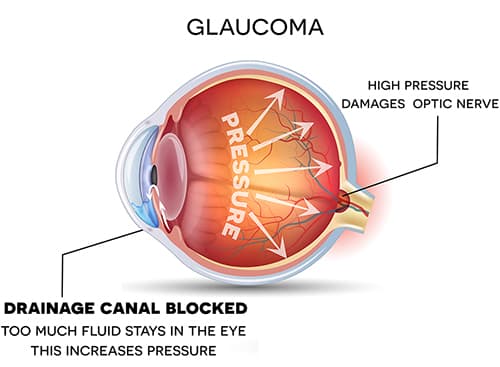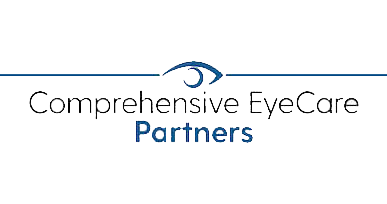Do you or someone you love have glaucoma? You’re not alone.
Glaucoma is a leading cause of permanent blindness in the United States and worldwide. Of the approximately 3 million Americans with glaucoma, only half know they have it.
How is this possible? The main reason is that many forms of glaucoma have no symptoms in their early stages. Although anyone can develop glaucoma, it’s more common in older adults.
Keep reading to learn more about glaucoma and why it doesn’t have more obvious symptoms.
What is Glaucoma?

Glaucoma is a group of eye conditions that damage the optic nerve. The optic nerve sends visual information to your brain, which enables you to see.
Glaucoma is often but not always due to abnormally high eye pressure or intraocular pressure (IOP). Over time, elevated intraocular pressure can destroy your optic nerve, which may lead to irreversible vision loss or blindness.
What Causes Glaucoma?
Your eye continuously produces a clear fluid called aqueous humor. The aqueous humor nourishes your eye and helps it maintain its shape.
The exact amount drains through the drainage angle as the aqueous humor flows into your eye. The drainage angle is at the corner where your iris and cornea meet.
Eventually, the aqueous humor moves out of your eye and into your bloodstream. In glaucoma, your eye can make too much fluid, or it may not exit your eye as it should due to an obstruction or partial blockage.
Consequently, fluid may accumulate and cause pressure to rise inside your eye, destroying the optic nerve. Optic nerve damage is permanent and can result in total blindness.
Types of Glaucoma
There are different types of glaucoma. However, the most common kinds include:
Primary Open Angle
Primary open-angle is the most common form of glaucoma and typically develops gradually over many years. It happens when the drainage channels in your eye become blocked over time.
Symptoms of Open-Angle Glaucoma
Open-angle glaucoma has no symptoms in the early stages. As the condition progresses, you may have the following symptoms:
- Gradual, patchy blind spots in your peripheral or side vision
- In later stages, you’ll have trouble seeing objects and people in your central vision
Angle-Closure Glaucoma
Angle-closure glaucoma is also called narrow-angle or closed-angle glaucoma. It occurs when your iris bulges.
The bulging iris entirely or partially blocks the drainage angle. The blockage prevents fluid from draining correctly and leads to a rapid increase in intraocular pressure.

Symptoms of Angle-Closure Glaucoma
Angle-closure glaucoma causes the following symptoms:
- Intense eye pain
- Severe headache
- Blurred vision
- Eye redness
- Halos
- Nausea or vomiting
Normal-Tension Glaucoma
The optic nerve can sometimes become damaged even when your eye pressure is normal. This is known as normal-tension glaucoma.
Symptoms of Normal-Tension Glaucoma
There are typically no symptoms in the early stages of normal-tension glaucoma. But with time, you may experience the following:
- Gradually blurred vision
- Loss of peripheral vision in the later stages
Why Glaucoma Doesn’t Have Noticeable Symptoms
Glaucoma is often called the “silent thief of sight.” That’s because many forms of glaucoma have no symptoms.
Damage to the optic nerve is usually so gradual that you might not notice any vision loss until the eye condition is already in its advanced stages. Many patients don’t realize they have glaucoma until permanent, irreversible vision loss has already occurred.
The optic nerve comprises over a million nerve fibers. As these fibers die due to high intraocular pressure, blind spots in your vision may form.
Often, you won’t realize there are tiny blind spots until most of the nerve fibers are damaged enough for the spots to become significant.
All the optic nerve fibers can die if glaucoma remains undetected and untreated, causing you to go blind. If you experience symptoms that appear abruptly, you may have acute angle-closure glaucoma.
Although less common, acute angle-closure glaucoma develops quite quickly. This type of glaucoma requires immediate medical attention as it can cause vision loss within a matter of hours.

Can Anyone Develop Glaucoma?
Glaucoma can damage your sight before you experience any symptoms. For this reason, it’s essential to know these risk factors. You’re more likely to develop glaucoma if you:
- Are over age 40
- Have high eye pressure
- Have had severe eye trauma
- Have a family history of glaucoma
- Are extremely nearsighted or farsighted
- Have used corticosteroid medications for a long time
- Are of Asian, African American, or Hispanic descent
- Have diabetes, high blood pressure, migraines, or poor blood circulation
Can Glaucoma Be Prevented?
Although there is no way to guarantee you won’t develop glaucoma, it can be managed and controlled if it’s diagnosed and treated early. The only way to detect glaucoma is through comprehensive, routine eye exams.
If you’re at a higher risk of developing glaucoma, your ophthalmologist may recommend eye exams more frequently to monitor your vision closely. Any vision already lost to glaucoma is permanent and can’t be restored.
However, early diagnosis and treatment can slow its progression and preserve your remaining vision. Eye drops are usually the first line of treatment.
Other ways of treating glaucoma include using oral medications, laser treatment, surgery, or a combination of all these options.
Glaucoma treatment aims to lower your eye pressure and prevent further vision loss. Because there’s no cure for glaucoma, having this eye condition requires frequent follow-up eye exams and treatment for the rest of your life to manage your intraocular pressure.
That’s a small price to pay for your eyesight.
Prevent Vision Loss from Glaucoma
Learn more about glaucoma by requesting an appointment with the specialists at Evergreen Eye Center. Timely diagnosis and treatment can help control glaucoma and delay or even halt further vision loss.

